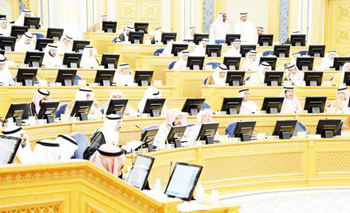 Jeddah, Nov 11: A proposal under consideration by the Shoura Council suggests the possibility of returning rehabilitated addicts to their former jobs after treatment. The security committee of the council has, however, rejected the proposal. Some members, on the other hand, quoted a survey indicating that 45 percent of current addicts are holding jobs at present.
Jeddah, Nov 11: A proposal under consideration by the Shoura Council suggests the possibility of returning rehabilitated addicts to their former jobs after treatment. The security committee of the council has, however, rejected the proposal. Some members, on the other hand, quoted a survey indicating that 45 percent of current addicts are holding jobs at present.
The proposal, submitted by Shoura member Ahmad Al-Mufreh, called on the parties concerned to encourage rehabilitated addicts from both the public and private sectors to go back to their previous job once the rehabilitation program had been completed successfully.
Meanwhile, the security committee at the council stressed the need to find supportive and adequate solutions that help addicts to quit their addictions, including extending financial help to their families if they are entitled to it. However, the majority of the committee did not approve adding extra provisions to the anti-drugs system, and suggested resorting to the regulations and channels of the Ministry of Social Affairs, or amending the social insurance system to realize this goal instead.
The security committee considered the proposal submitted by Al-Mufreh as containing phrases and items unrelated to the subject matter of the anti-drug law and provisions, which itself did not include any specifications regarding the eligibility of the addict themselves, such the person's status as an employee, worker, unemployed, male, female, citizen or resident. The proposal, in comparison, included provisions that touch on the employment judgments that should apply on the affected employee, such as their retirement entitlements and subjection to guardianship if unable to act on their own. Such provisions, according to the security committee, are stated in other regulations and laws. The committee did not approve the proposal on these grounds.
Representing the minority of members from the security committee who had voted in favor of the proposal, member Abdulrahman Al-Atwi said that the proposal is very important, and that its provisions should be added to the anti-drug law, pointing to the increasing problem of drugs in the Kingdom.
The report submitted by the minority of the committee confirmed that the proportion of currently addicted persons in employment today exceed 45 percent of the total number of addicted in Saudi society. This percentage represents job categories such as doctors, officers, pilots and others. The survey indicated that 70 percent of prisoners today are detained due to drugs-related issues.






Comments
Add new comment